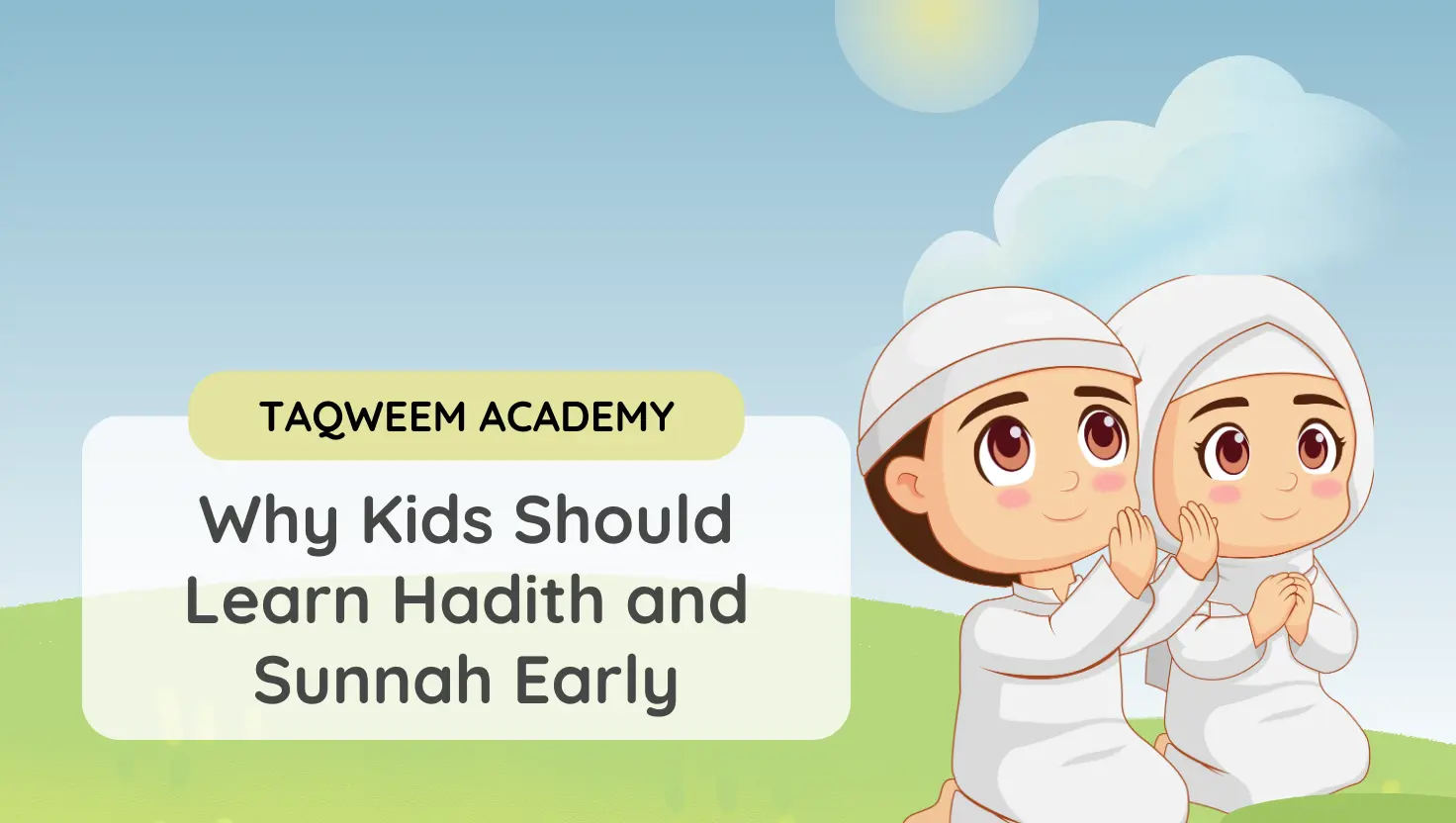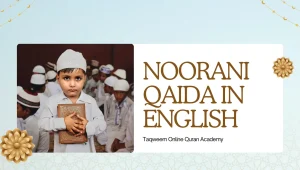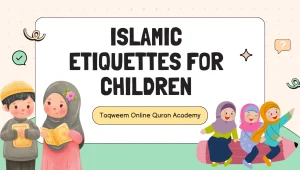Sometimes I look at children and think — subhanAllah, their hearts are like clean notebooks. Every word we write on them, every act they see, becomes part of who they are. And it scares me too, because if we don’t teach them the right things early, the world will teach them its noise.
That’s why I’ve always felt it’s important to give kids the gift of Hadith and Sunnah — but not in a heavy, boring, “sit still” way. Kids don’t respond to lectures. They respond to warmth, to stories, to little habits they see every day.
Table of Contents
ToggleWhy Should Kids Learn Hadith and Sunnah Early?
If a child learns that the Prophet ﷺ said, “The strong one is the one who controls anger,” do you realize how powerful that is? It’s not just memorization — it’s a compass for their whole life.
When they learn that smiling is Sunnah, suddenly kindness isn’t just “being nice” — it’s worship.
Teaching Hadith and Sunnah early doesn’t just build knowledge. It builds character. It gives kids something to hold on to when they grow older and the world tests them.
Making Hadith Learning Simple for Kids
We adults complicate things. Children don’t need 100 rules at once. They need small steps.
-
Stories at bedtime: Instead of just “once upon a time,” why not share a short Hadith story? Like how the Prophet ﷺ showed mercy to animals, or how he greeted children first.
-
Games: Turn Sunnah into playful moments. Ask: “What do we say before eating?” Let them shout Bismillah! with pride.
-
Praise: The Prophet ﷺ always encouraged children. A small hug or smile when your child practices a Sunnah leaves a mark deeper than any textbook.

Bringing Sunnah into Daily Life
It doesn’t have to be a classroom setting. In fact, the most powerful lessons are in little, daily actions:
-
Before eating, teach them the dua.
-
Before sleeping, whisper the Sunnah duas with them.
-
When leaving the house, remind them to say Bismillah, tawakkaltu alAllah.
It’s the tiny routines that become their lifelong habits.
The Struggle Parents Face
Let’s be real — it’s not always easy. Kids fidget. They get bored. Some days you feel guilty because you couldn’t sit with them at all.
But here’s the comfort: even one Hadith, one Sunnah, if taught with love, can outlive us in their actions. We don’t need to load them with volumes. We just need to start with gentleness.
How the Prophet ﷺ Taught Children
This always melts me. Once, the Prophet ﷺ shortened prayer because he heard a baby crying — so the mother wouldn’t worry. That’s the level of mercy he showed.
He would kneel to children’s level, greet them first, make them feel important. That’s Sunnah. That’s the teaching method. And if we want our kids to love Hadith and Sunnah, we have to follow that same way — patience, kindness, mercy.
Parents, Teachers, and Role Models
Children learn more by watching than by listening. If we want them to say Bismillah, they need to see us say it first. If we want them to greet, they should see us greet with warmth.
But we also need help. That’s where teachers and academies come in — people who know how to nurture children’s love for Islam in ways parents sometimes can’t manage alone.

Taqweem Online Quran Academy
If you’ve been wondering how to make this journey easier, Taqweem Online Quran Academy can help. Their programs are designed to make Hadith and Sunnah simple for kids — using stories, interaction, and compassion. The way children learn there isn’t just about memorizing; it’s about living the Sunnah.
If you want your child to grow up with the Prophet ﷺ as their role model, this is where to start. Check out Taqweem Online Quran Academy today.
Final Thought:
Our kids don’t need perfection. They need love. They need us to sprinkle Hadith and Sunnah into their days until it becomes second nature. And inshaAllah, years from now, those little seeds will grow into towering faith.
FAQs
What is the 7-7-7 rule in parenting?
The 7-7-7 rule in Islamic parenting is often explained as guiding children in three stages:
-
From birth to age 7: focus on love, play, and gentle teaching.
-
From 7 to 14: introduce discipline, manners, and regular prayer.
-
From 14 to 21: treat them as young adults, with trust and responsibility.
This method reflects wisdom found in Islamic parenting traditions.
What is a Prophet’s lesson for kids?
One of the most important lessons from the Prophets for kids is kindness, honesty, and always remembering Allah. For example, Prophet Muhammad ﷺ taught children to greet others with peace (saying Assalamu Alaikum) and to always speak the truth.
How do you explain prophecy to children?
You can explain prophecy to kids by saying: “Prophets are chosen people sent by Allah to guide us and teach us the right path.” Using simple stories from the Quran, like Prophet Nuh’s Ark or Prophet Ibrahim’s courage, helps children understand easily.
What are the three main messages of the Prophets?
The Prophets of Islam carried three main messages:
-
Worship Allah alone (Tawheed).
-
Follow good character and justice.
-
Prepare for the Hereafter with faith and good deeds.
Who is the Prophet for kids?
For Muslim kids, Prophet Muhammad ﷺ is the best role model. He was gentle with children, smiled at them, and taught them prayers and manners in a way they could understand.
What is a short hadith for kids to memorize?
A simple hadith kids can memorize is: “Smiling at your brother is charity.” (Tirmidhi). It’s short, easy, and teaches kindness.
What is Sunnah in Islam for kids?
Sunnah means the way of the Prophet Muhammad ﷺ. For kids, Sunnah includes simple daily actions like saying Bismillah before eating, using the right hand, and greeting with Salam.
What is hadith in Islam for kids?
Hadith is the sayings and actions of Prophet Muhammad ﷺ. They help Muslims understand how to live. Kids can learn hadith to practice honesty, kindness, and respect.
What did the Prophet ﷺ say about teaching kids?
The Prophet Muhammad ﷺ said: “Teach your children to pray when they are seven years old.” (Abu Dawood). This shows the importance of starting prayer and good habits early in life.






